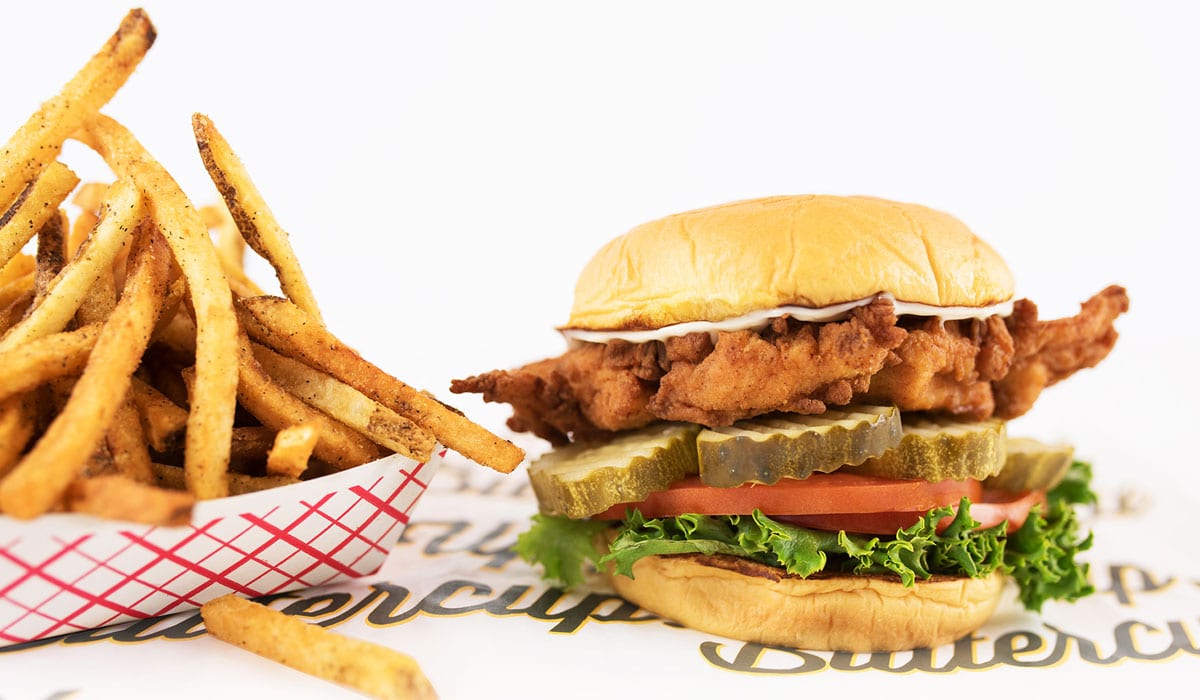Super Chix CEO Darryl Neider realizes that the brand’s slogan—an offer of the “Last True Chicken Sandwich”—holds a bit of mystery for the average consumer.
“We were looking for a slogan that was catchy but that came with questions. You see a lot of billboards with all the information about what’s coming soon or what’s on the menu, but our slogan catches people’s attention and they want to know what this sandwich is,” he says.
In 2014, Super Chix opened in Dallas as a Yum! Brands–owned fast casual. The concept existed in contrast to Yum’s quick-serve chicken success (KFC) with a slimmed-down menu, cleaner ingredient list, and upscaled dining environment that didn’t include a drive-thru window. Since opening, founder Nick Ouimet and a group of investors have bought the company from Yum!, and then, in 2018, Neider’s restaurant group, MeisterBrands LLC, pivoted from being a Five Guys franchise and merged with Super Chix. Throughout the changes, the Last True Chicken Sandwich has remained the same.
Neider says the slogan singles out the sandwich—hand-breaded chicken cooked in peanut oil and served with kosher pickles made from Texas cucumbers atop a butter-toasted bun—helping highlight its quality in the highly competitive chicken market.
Founder: Nick Ouimet
Headquarters: Salt Lake City
Year started: 2014
Annual sales: Undisclosed
Total Units: 7
Franchised Units: 2
Website: superchix.com
The Super Chix menu builds on its foundational fried chicken sandwich with a handful of other unfussy staples, like juicy grilled sandwiches and tenders, hand-cut fries with optional seasonings, freshly sliced and diced salads with a variety of dressings, and frozen custard in flavors like Dutch Chocolate and Pure Vanilla. Rather than participate in widespread industry competition, Neider says, the concept separates itself from other brands with an emphasis on keeping the menu simple and quality-made.
“There’s a lot of hype in the market about who has the better chicken sandwich,” Neider says. “But what separates us is our emphasis on freshness and quality; we offer a better product in fast casual that is close to the same convenience as a quick-serve chain. Our chicken is fresh, never frozen … we eliminate the veto vote by focusing on our salads as much as our fried chicken.”
Right now, there are five corporate locations—four in the brand’s original Dallas-Fort Worth market and one in American Fork, Utah, near the chain’s new Salt Lake City headquarters. Two franchised stores in Alabama make for a total of seven stores.
Neider says a series of units are in talks for Alabama, Texas, and Utah, as well as for new franchises in Georgia, Tennessee, Mississippi, Florida, North Carolina, Virginia, and Idaho. The Super Chix growth strategy comes down to a mix of corporate and franchised units.
“Our objective is to have 20–30 percent of our locations as corporate stores. This keeps us current; we’re out there doing the same thing our franchisees are doing and looking for real estate, training new staff, etc.,” Neider says. “We’re in the deep end with this, too, and most franchisees like to see that commitment.”
In the next year, the team has their fingers crossed for as many as four new corporate stores and as many as eight new franchise spots. The idea, Neider says, is slow and measured growth that handles new real estate with kid gloves.
In terms of franchisees, Neider says he has been fielding calls from a variety of would-be operators. The interested franchise groups that passed the chain’s test are those touting plenty of past experience. The goal isn’t for these groups to open as many stores as possible in the near future, but, instead, to show corporate that they know what they’re doing.
“We feel like our responsibility from a franchisor standpoint is to create an economic architecture that allows franchise groups coming in to be profitable—as long as our franchisees are good operators and pick out really good real estate. The people we’re inviting on the bus are people who know how to develop concepts,” Neider says.
On the customer side of the equation, Neider says that millennials are a top demographic, specifically young professionals and families with small children who are looking for fresh, quality fare in a casual environment. Empty nesters are another consumer sector of note, adding some range to the brand’s target demographic; Neider says that these diners are increasingly health-conscious, with a need for a better-for-you chicken option that Super Chix is all too happy to fill.
With a menu that attracts a variety of age groups, minimal, regionally motivated tweaks are all that’s on the docket for food and beverage changes over the next year. The brand’s core offering of the Last True Chicken Sandwich will always be available, and Neider says different items that aren’t already up for grabs (like burgers) won’t make an appearance.
Another focus is added options that can accommodate diverse diets as the chain continues to innovate on its existing salads and also bulks up the menu with fresh meatless options (like the vegetarian-friendly Breaded Crispy Avocado Sandwich).
“We feel like we have a great main product, but as we become more established, we’re going to be looking for other adjustments that make sense market-to-market,” Neider says.






